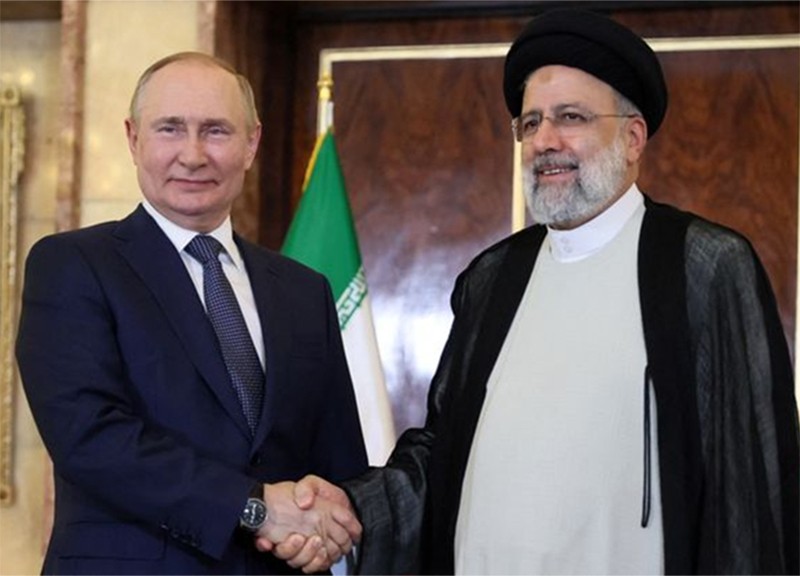
As Iran ponders strike on Israel and Ukraine penetrates Russian border, Moscow and Tehran weigh how much they can help each other
By Yaroslav Trofimov - WSJ
DUBAI—The parallel escalations in the Middle East and in the Russian war with Ukraine are creating fresh challenges for the budding partnership between Iran and Russia, two nations that have grown increasingly close because of their shared hostility to the U.S.
Russia and Iran can fill gaps in each other's intelligence and military capabilities-Russia makes sophisticated air defenses and aircraft, while Iran has developed powerful drones and missiles.
Iran has said it would mount a forceful retaliation against Israel for the July 31 killing of Hamas leader Ismail Haniyeh in Tehran. Russia, surprised by the Ukrainian invasion of its Kursk region, is scrambling to respond as Kyiv readies its first F-16 aircraft and moves to de stroy Russian air defenses.
This convergence of events means that each country has little spare capacity to offer the weapons that the other needs most at least for now.
"Iran risks that what it had conceived as a contained mili tary action against Israel turns into an all-out war," said Ali Vaez, Iran project director at the International Crisis Group. "If that happens, Iran needs every missile that it has in the same way that Russia needs every missile de fense system that it has."
From Moscow's perspective, diplomats and intelligence officials say, the calculation is simple: A major Middle East war would hamper its own war effort and complicate relations with nations that allow Russia to mitigate the effect of Western sanctions, such as Saudi Arabia and the United Arab Emirates.
After centuries of conflict and ideological differences, a partnership between Moscow and Tehran coalesced a decade ago, as Russian President Vladimir Putin turned away from the West after his 2014 Ukraine invasion. At the time, Russia and Iran successfully joined in Syria to prevent the collapse of President Bashar al-Assad, who was losing control to a U.S.-supported insurgency.
Russian setbacks in Ukraine after the February 2022 invasion changed the balance of power in its relationship with. Iran. The country's aura of military prowess was punctured and its economy was subjected to international sanctions that, in some ways, exceed those that Iran has faced for decades. Moscow went from being an undisputed senior partner to a nation desperate for military assistance from Tehran. "After the recent defeats in Kursk, Russia needs Iranian support more than ever," said Meir Javedanfar, Iran lecturer at Reichman University in Israel. Iran started supplying Russia with thousands of Shahed attack drones, artillery ammunition and some of its Mohajer drones that can fire missiles in the fall of 2022, after a Putin visit to Tehran. So far, however, Iran has rebuffed Moscow requests for ballistic missiles. A senior Western official described the potential supply of several hundred such missiles to Russia as a "game changer" in Ukraine saying Iranian stocks exceed the number of costly interceptors Kyiv can get.
The U.S. this week warned Iran of "a swift and severe response" by Washington and its allies should the Iranian missiles be provided to Russia.
"Western powers have made it clear to Tehran that the transfer of ballistic missiles to Russia would burn any remaining diplomatic bridges over sanctions easing," said Ellie Geranmayeh, Iran expert at the European Council on Foreign Relations. Tehran, she said, is unlikely to push these red lines until it establishes what Iran policy will be adopted by the next U.S. administration. Iran's weakest spots are its rudimentary air defenses and outdated combat aircraft-areas where Russia has long promised to help. However, the sale of Su-35 multirole fighters announced years ago has yet to be completed, with Western intelligence officials wondering about the delay.
With Ukraine launching frequent drone and missile attacks on military and infrastructure targets in Russia and occupied parts of Ukraine, Moscow can't protect its own territory with sufficient air defenses. Several S-400 batteries have been destroyed. While Moscow and Tehran increasingly bond over their enmity to the U.S., they don't publicly support each other's war goals against their regional enemies.
While Iran seeks the eradication of Israel, Moscow maintains full relations with it, including visafree travel for each other's citizens and daily direct flights that continue even as air car- riers from the U.S. suspended their links with Tel Aviv. Russia is also cultivating relations with Iran's Arab rivals, Saudi Arabia and the U.A.E. "Russia and Iran have distinctive ideologies, competitive national interests and centuries of mutual mistrust," said Karim Sadjadpour, a senior fellow at the Carnegie Endowment for International Peace. "They cooperate when it suits their defiance of the U.S.-led world order, but neither will risk their hold on power by fully committing to each other's cause."
Moscow and Tehran Harbor Mutual Suspicions
Mutual suspicion exists between Iran and Russia. In May, after the helicopter crash that killed Iranian President Ebrahim Raisi and Foreign Minister Hossein Amir-Abdollahian, both seen as advocates of closer cooperation with Moscow, Russian military analysts speculated that the incident might have been orchestrated by elements of the Islamic Revolutionary Guard Corps who seek eventual rapprochement with the West.
The July election of Pres ident Masoud Pezeshkian, who campaigned on promises of better ties with Europe and lowering tensions with the U.S., solidified such fears. Iran's establishment worries Moscow would betray Tehran if it make a deal with the U.S. over Ukraine.
"The historical mistrust factor is by far outweighed.... in this global confrontation with the West," said Hanna Notte, director for Eurasia at the James Martin Center for Nonproliferation Studies.














